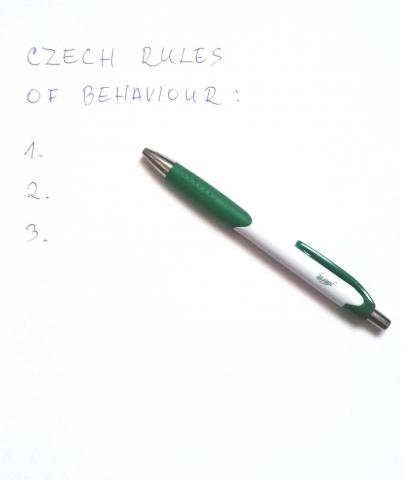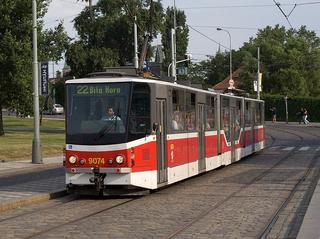Unwritten Rules of Behaviour

Our culture is very much a verbally polite one. That’s probably because this country has been densely inhabited for centuries, so we had to find a way to get along with everyone. Also, we belonged to Austria for 300 years so it’s possible that some of the Austrian etiquette rubbed on us :-)
And so it happened that we created many unwritten rules of behaviour. Czechs keep them when they want to be treated kindly. But that’s the problem with these rules: they’re unwritten. Foreigners don’t know about them, and sometimes get rude treatment as a result—not knowing that they stepped on invisible toes. So I tried to write them down for you:
-
Don’t talk too much and don’t be too loud. The usual voice volume here
is quite low. Only teenagers, overly self-confident and drunk people
are loud here, and other people resent that.
But don’t get me wrong, we love to chat, and loudly—in bars and pubs. In other places, we prefer people who have the patience not to be too loud or talkative at the beginning and to wait for our reaction. -
Upon entering a lift/elevator, a small shop, a waiting room or a closed
train compartment, you’re expected to nod your head at the people and greet
them by saying “Dobrý den!” (“dobree denn”).
In regional areas, this applies to all spaces except trams, buses and supermarkets. You’re even expected to greet the shop assistants in a small local supermarket, or the person on a train you’re sitting down next to.
Receptionists will be happy if you smile and greet them by “Dobrý den” every time you enter your hotel, even when you don’t need anything from them. -
Our private space isn’t very big, just some 30 centimetres around our body.
But we’re quite sensitive about it. So, even when you’re entering a crowded
place with a lot of people, keep a small distance from the person
in front of you and move carefully.
If there’s a person sitting and other 2–3 seats are free on their left side, sit down on the farthest seat. When you’re sitting down, do it carefully—make sure other people can see that you don’t want your coat or bag to hit anyone. - Before closing the door, make sure there isn’t anyone behind you. If there is, hold the door for them.
- Before entering a door, step aside and let people go out first. Don’t stand right in front of a door when a train / bus / tram / metro arrives.
- I’ve seen too many dirty looks being thrown at tourists who remained standing at the door after boarding a tram / bus / metro, blocking them for everyone else. So if you want to avoid the angry looks, please go farther towards the centre of the carriage. Czechs stand at the door, too, but only when they know they’ll be getting off soon.
- If you’re sitting on a tram / bus / metro and an old person or a pregnant lady enters, you’re supposed to stand up and offer them your seat. Especially if you’re sitting in a seat that’s close to the door and has a small green cross next to it.
- It’s forbidden to eat and drink on public transport, with the exception of a brief drink from a bottle or a closed cup. That’s because someone’s clothes might get smeared when the vehicle starts moving.
- If you go to a theatre to see a play, be sure to wear something nice (not jeans and boots).
- When you accidentally touch or hit someone, say “pardon” (pronounced as “parr-donn”; it’s from French and it means “sorry”). Don’t say “sorry” in English—it’s teenagers’ slang here, so you might get the irritated “yeah, whatever” look instead of the “that’s OK” look. In Prague, we don’t always say “pardon” after touching or hitting someone accidentally—there’s a busy metropolis for you. But it’s safer to do so.
- If you visit somebody’s house, take your shoes off. The lady of the house will offer you slippers. Don’t worry, they keep them clean :-) It’s considered rude to walk around a house in your shoes, because they might be dirty and the family would have to clean the floor. In some cases, the lady will tell you “don’t take your shoes off, I’m washing the floor tomorrow anyway.”
- When a gentleman is accompanying a lady to a café or a restaurant, he’s expected to enter the place first, choose a good table and ask her if she’s OK with it. Some ladies expect their man to offer them a chair, take their coat, and when the waiter comes, take the menus from him and give one to the lady. ALL ladies will be happy if you let them order their meal first. The gentleman is often expected to pay for the meal, but that depends on the situation. The lady will probably say “I’ll pay my share”.
